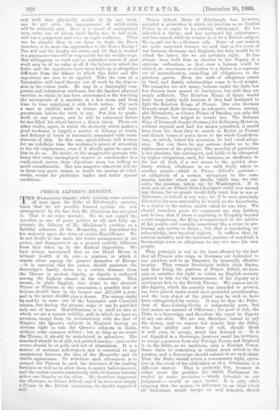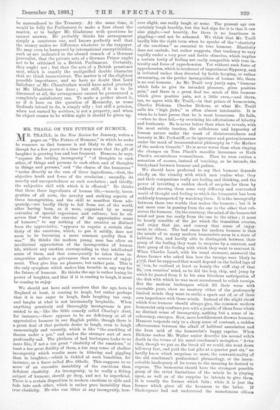PRINCE ALFRED'S ANNUITY. T HE Westminster Gazette, while quoting some remarks
of ours upon the Duke of Edinburgh's annuity, hints that we are possibly biassed against the new arrangement by the fact that Mr. Gladstone has accepted it. That is an entire mistake. We do not regard the question as one of party politics at all, and fully ap- preciate the delicacy of Mr. Gladstone's position as a faithful adherent of the Monarchy, yet dependant for his majority upon the votes of crypto-Republicans. We do not doubt he has made the wisest arrangement in his power, and disapprove it on a ground entirely different from that taken up by the Radical Opposition. We have always maintained that as our Royal House is without wealth of its own—a position in which it stands alone among the greater dynasties of Europe —it is essential that the nation should maintain the Sovereign's family drivin to a certain distance from the Throne in modest dignity, as dignity is reckoned among the highest classes in the community. That means, in plain English, that down to the eleventh Prince or Princess in the succession, a, possible heir or heiress should have in the former case £15,000 a year, and in the latter £5,000 plus a dower. The money ought by-and-by to come out of the Lancaster and Cornwall estates, but during the present reign it can be provided only out of taxes. Republicanism is in itself an idea in which we see a certain nobility, and to which we have no aversion, except from its inconsistency with the fact of Empire, the Queen's subjects in England having no obvious right to rule the Queen's subjects in India, without some common arbiter ; but so long as we retain the Throne, it should be maintained in splendour. The standard should be of silk, not painted canvas,—just as the crown should be of gold, and not of aluminium. It is a matter of national self-respect, and is essential to any consistency between the idea of the Monarchy and its visible appearance. To withdraw such allowances is to compel the Princes to seek the heiresses of the trading fortunes as well as to allow them to marry ballet-dancers, and the nation cannot consistently with its history tolerate either one blunder or the other. We therefore supported the allowance to Prince Alfred, and if he were now simply a Prince in the British succession, we should support it still, Prince Alfred, Duke of Edinburgh, has, however, accepted a promotion in which his position as an English Prince is, or ought to be, entirely submerged. Be has inherited a throne, and has acecepted his inheritance ; and has ceased, while he retains it, to be a British subject. He is, and can be, a German only. Some of our readers are quite surprised because we said that in the event of war between Germany and England, his duty would be to attack the latter, but we are certainly right. It has always been held that as election to the Papacy is a supreme ordination, so that even a layman could be elected, so succession or election to a throne is a supreme act of naturalisation, cancelling all obligations to the previous pa tria. Even the oath of allegiance ceases to bind, and family relationships cease to be of weight. The examples are not many, because under the Salic law few thrones have passed to foreigners, but still they are amply sufficient. The Bourbon Kings of Spain would have been justly held traitors if they had hesitated to fight the Bourbon Kings of France. Our own German dynasty must fight Germany on adequate reason arising, and Bernadotte, as Crown Prince of Sweden, not only did fight France, but helped. to invade her. The German King of Denmark fought Germany for Schleswig-Holstein, without reproof, and had his means permitted, it would. have been his clear duty to march to Berlin or Vienna and dictate terms of peace there to the whole Confedera- tion, to which, before his accession, he bad owed allegi- ance. Nor can there be any serious doubt as to the righteousness of the principle. The morality of patriotism is not absolute, but contingent, and liable to be abrogated by higher obligations, such, for instance, as obedience to the law of God, if a war seems to the patriot abso- lutely wicked, obedience to an oath freely taken to another people—which is Prince Alfred's position— or obligation of a certain stringency to the com- munity amidst which one dwells, which was, we con- ceive, the position taken up by Washington. If it were not so, no Prince born a foreigner could ever ascend any throne, for no people would fully trust him in war or diplomacy, or indeed in any way; for if he were genuinely devoted to his new nationality he would, on the hypothesis, be a traitor to the nation amidst which he was born. We should ourselves press the argument one step further, and declare that if there is anything in Kingship beyond a civil magistracy, the King is consecrated to the service of his people, and commits something like a crime in pre- ferring any service to theirs ; but that is wandering, we acknowledge, into mystical regions. It suffices that, by natural morality and the universal practice of mankind, a Soverereign, owes no allegiance to any one save his own people.
That principle is not in the least affected by the fact that all Princes who reign in Germany are federated to one another, and to an Emperor, by unusually effective treaties. They remain Sovereigns within their States, and that being the position of Prince Alfred, we have only to consider his right to retain an English annuity granted to him for the maintenance of his dignity as a contingent heir to the British Throne. We cannot see it. His dignity, which the annuity was intended to protect, has been placed under much more powerful guardianship, and the very object of the grant may be said to have been extinguished by events. It may be that, the Duke- dom of Saxe-Coburg-Gotha is temporarily poor, but that makes no manner of difference ; for poor or rich, the Duke is a Sovereign, and therefore the equal in dignity of any one alive. We are not, therefore, bound to pay the money, and we cannot but wonder that the Duke, who has ability and force of will, should think it well even to accept, much less demand it. It is not dignified in a Sovereign, however small his territory, to accept a pension from any Foreign Power, and England is to the Duke, as we maintain, only a Foreign Power. Some claim to something in return must attach to the pension, and a Sovereign should submit to no such claim, That the Duke should. retain a reversionary right, opera- tive in the event of his abdication or of a revolution, is a different matter. That is perfectly fair, because in either event the position for intended Parliament in- tended to make provision — wisely ntended in our judgment would at once revive. It is only while reigning that the money, in deference to an ideal which all historians would accept as well founded, should bo surrendered to the Treasury. At the same time, it would be folly for Parliament to make a f ass about the matter, or to badger Mr. Gladstone with questions he cannot answer. He probably thinks his arrangement simply a courteous one, and knows perfectly well that the money makes no difference whatever to the taxpayer. He may even be hampered by international susceptibilities, such as are indicated in the absurd remark of a German journalist, that the private acts of a German Prince ought not to be criticised in a British Parliament. Certainly, they ought not ; but then the acts of a British pensioner may, which is exactly the undignified double character that we think inconvenient, The matter is of the slightest possible importance, and we have no doubt that Lord Salisbury or Mr. Chamberlain would have acted precisely as Mr. Gladstone has done ; but still, if it is to be discussed at all, the arrangement cannot be pronounced a completely satisfactory one. To make a pother about it, as if it bore on the question of Monarchy, as some Radicals intend to do, is simply silly ; but still a pension, when not earned by services, is not a property, and when its object ceases to be within sight it should be given up.



































 Previous page
Previous page